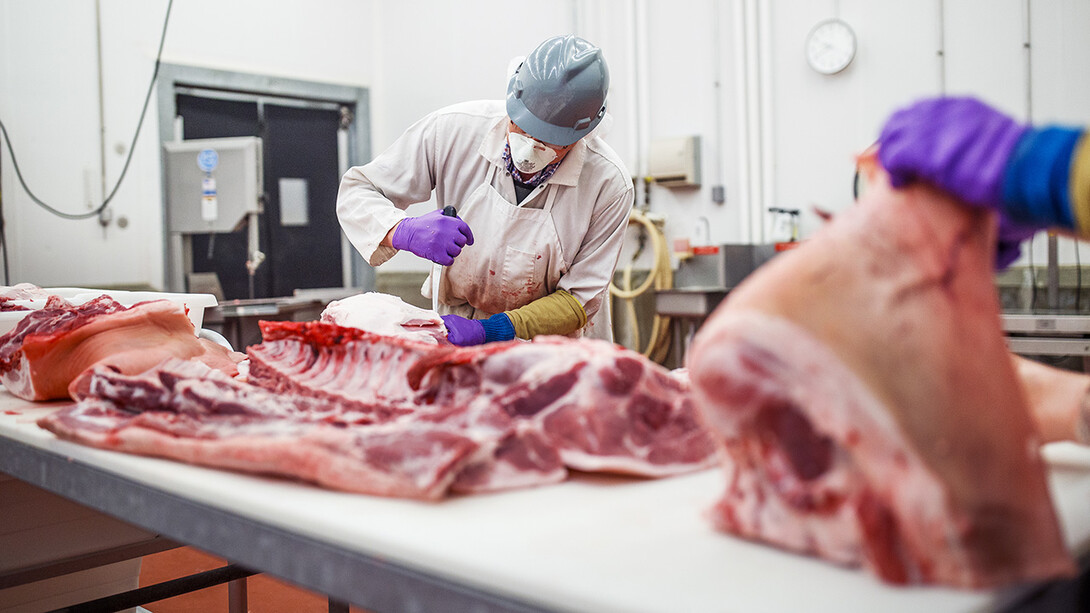
The University of Nebraska–Lincoln announced plans to develop the Small Meat Processing Plant of the Future during a roundtable discussion Feb. 26 at the Nebraska Association of Meat Processors annual convention in Grand Island.
“The Small Plant of the Future will be a multi-disciplinary center to strengthen the meat industry in the region,” said Clint Krehbiel, head of the university’s Department of Animal Science.
The plant, to be located alongside existing animal science facilities, will serve as a regional processing hub for local cattle producers, as well as a prototype for other small and very small facilities.
As part of the initiative, the university will look at making equipment upgrades to the Loeffel harvest and processing facility on East Campus, hire and train staff to maintain regular slaughter operations, and establish a suite of resources available to those looking to set up or expand small processing operations. The project is structured to have a multiplying effect across the region.
Krehbiel said the COVID-19 pandemic illuminated issues that small meat processors had faced for years, including the insufficient capacity of small processors to keep up with rising demand, barriers to implementing new technologies, and widespread workforce shortages. The Small Plant of the Future aims to address those issues.
Multiple processors at the roundtable raised the issue of labor and staffing challenges. To help strengthen the workforce, the Small Plant of the Future will include a set of workforce development programs, including an internship program that will pair meat science students with small meat processing businesses across the state. The university continues to look at other ways to integrate both degree and non-degree programs into its Small Plant initiative. This may include training programs, including workshops for employees new to the meat processing industry; partnerships with community colleges; and continuing education opportunities for more experienced meat processors.
“UNL has been a leader in meat science for over 100 years,” Krehbiel said. “We want to be part of the solution.”
Representatives from the U.S. Department of Agriculture’s Agricultural Marketing Service and Food Safety and Inspection Services were present at the roundtable; USDA Rural Development personnel joined remotely. The event came just two days after the USDA announced it was making available $215 million in grants and other support to expand meat and poultry processing options, strengthen the food supply chain, and create jobs and economic opportunities in rural areas. The university hopes to look to this program as one potential source of funds; other fundraising efforts for the plant are already underway.
The Small Plant of the Future concept comes at a time when the university has already committed millions to building and expanding existing food facilities, including the Food Processing Center and the Feedlot Innovation Center, said Mike Boehm, NU vice president and Harlan Vice Chancellor for the Institute of Agriculture and Natural Resources.
“The Small Plant of the Future is a natural extension of what we’ve been building at a time when the industry is in dire need,” Boehm said. “The Small Plant of the Future is a dream initiative for a land-grant institution like UNL — one that marries academic programs with hands-on application and deep community partnerships that strengthen the region’s economy.”
Chad Lottman, who attended the roundtable, said the discussion on workforce development caught his attention. Lottman and his wife, Courtney, own Landmark Snacks in Beatrice, which produces meat sticks and other processed snack foods and employs about 200 people. Prior to starting that business, the Lottmans ran C&C Processing, a small meat locker in Diller. Processors of all sizes are struggling to find reliable, qualified employees, he said.
“We need a skilled workforce,” he said.
Lottman said an internship program in particular would be valuable to his business, which already employs several Husker graduates in its food safety division. For smaller processors, he said, help implementing new software programs and other technologies would be invaluable.
“For the small processor, that’s difficult,” he said.
Krehbiel said he anticipated some workforce development programs could be in place by fall, with the addition of more programming and facility improvements incrementally over the next several years.







